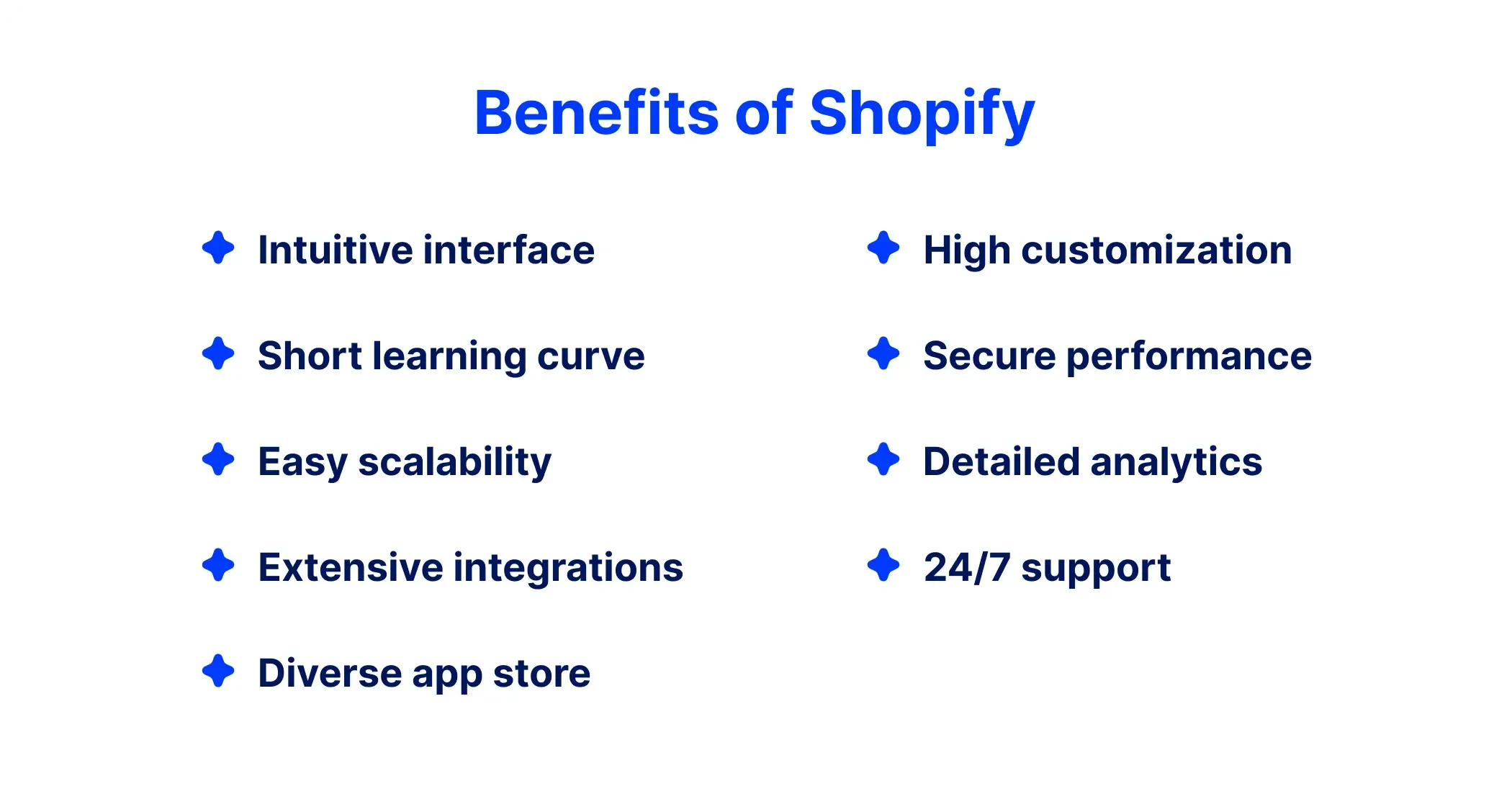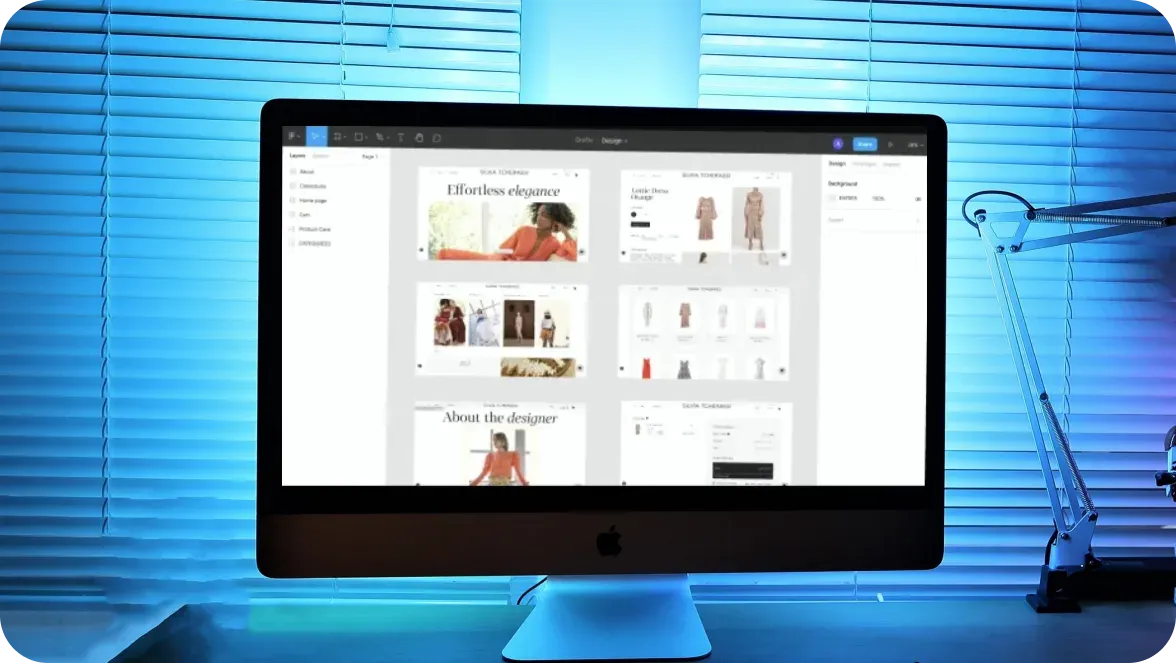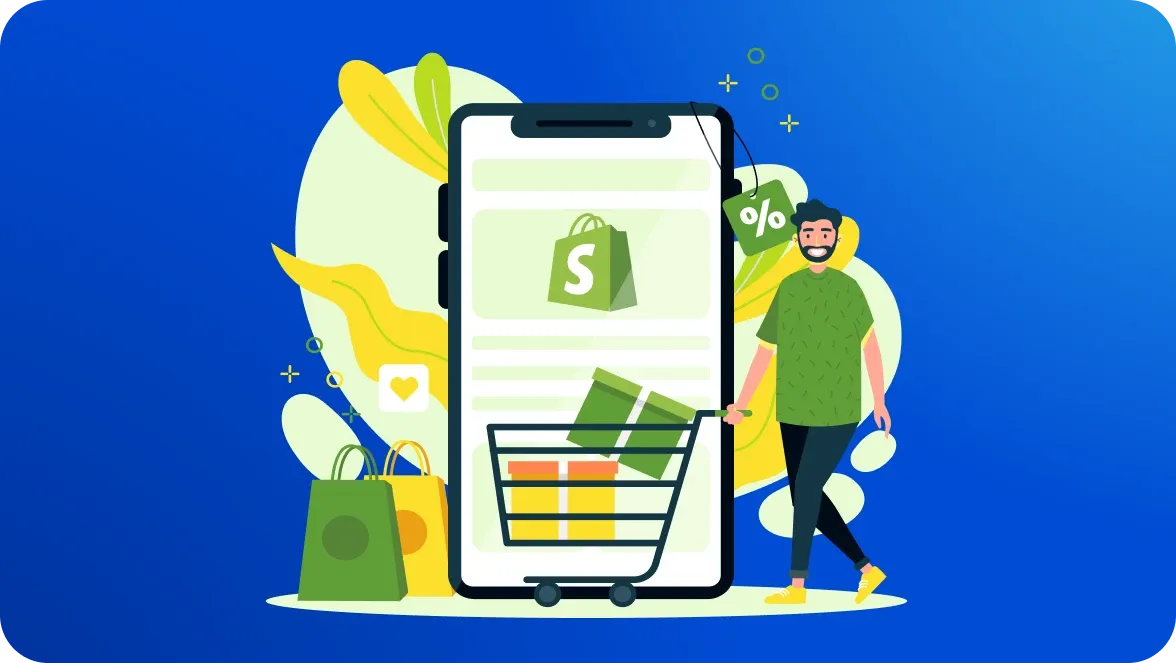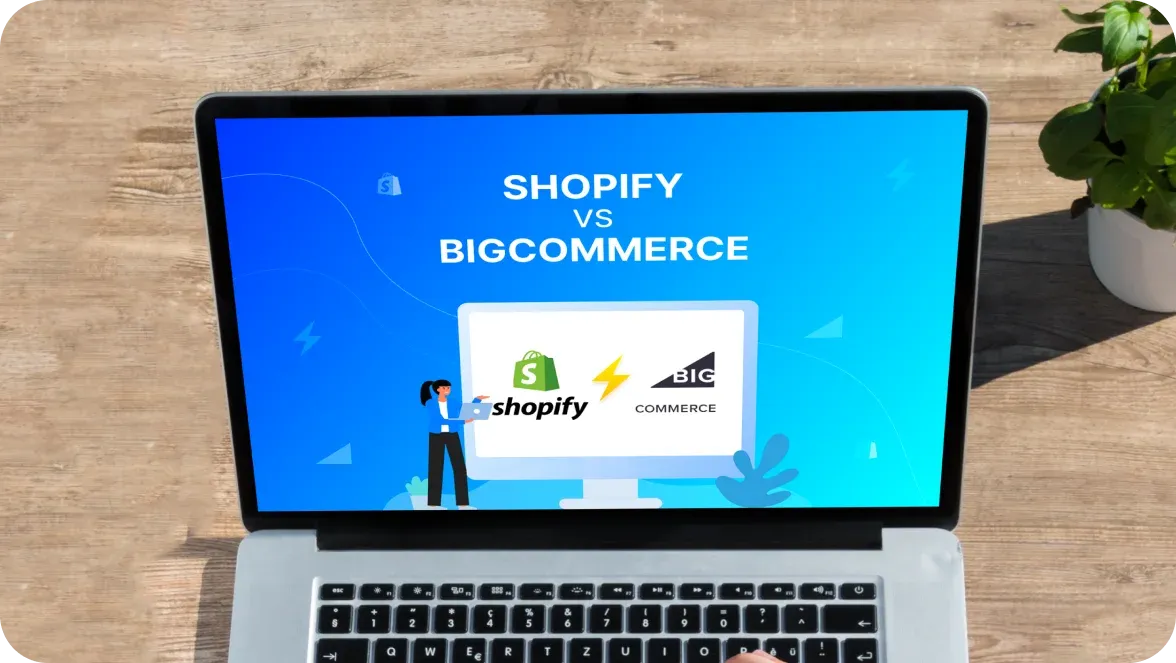
Shopify has many advantages. We often mention how flexible and innovative this platform is, and that’s not an exaggeration. Shopify integrates with numerous tools and offers advanced personalization. The platform keeps up with trends, rolls out regular updates, and does everything to accommodate its clients’ needs.
Do you need more proof of its credibility? Some of the world’s biggest brands are Shopify clients. Online stores from diverse categories belong here. Brands that use Shopify sell makeup, grocery, clothing, and technology. There are even charity and social initiatives on the list. The flexibility and innovation mentioned above are among the factors enabling this.
Our team has been developing Shopify stores for over eight years. Hardly any of our experts will find it surprising that Shopify is the number-one choice for many successful businesses. In this article, you’ll learn which companies use Shopify. You can use their sites for reference or inspiration.
But more importantly, let’s deconstruct the formula behind this popularity. What makes Shopify a go-for solution? What ideas can your ecommerce business drive from these examples? Our team analyzed some of the biggest brands on Shopify and their ecommerce stores. We highlighted the tips and practices that might be useful for you.
Major companies across industries using Shopify
So, who uses Shopify? This universal ecommerce platform opens advantages for businesses regardless of their niche. Have a look at some well-known companies that chose Shopify for their stores.
Retail and consumer goods
Retail and consumer goods companies include those in fashion, beauty, home goods, and more. Thus, the stores in this category vary not only in Shopify website design.

This store traditionally opens the majority of lists of brands that use Shopify. It’s a huge leading beauty industry player with a wide range of goods such as makeup products, fragrances, body care, and baby care. Kylie Cosmetics has a strong social media presence. The website is a part within its ecosystem embodying its unique aesthetics.

This global beauty retailer also uses Shopify. One of Sephora’s highlights is its dedication to inclusivity and innovation. The company’s online store also reflects this. For example, there are virtual try-on features in addition to customized collections.

Mattel is associated with some iconic toys – in particular, Barbie, Hot Wheels, and Fisher-Price. As you can guess, on their website, users can buy these and other toys for children of all ages. The corporation’s store is intuitive and has a well-thought-out navigation that doesn’t overwhelm users.

Staples is also among the biggest Shopify brands. The leading office supplies, furniture, and technology retailer operates in B2B and B2C sectors. This serves as proof that Shopify can handle large product inventories and function seamlessly. Also, the store combines item and service ordering functionalities on a single website.

The store offers a vibrant collection of home decor items, ranging from furniture and rags to art prints. This company celebrates color, pattern, and plants. It promotes sustainability and supports artisans worldwide. The design of its online store fully reflects these vibes and values.

The company sells luxury bedding at accessible prices. Shoppers can find sheets, comforters, pillows, towels, and other items for their homes here. Brooklinen prioritizes quality materials and customer satisfaction, which includes a generous return policy. The online store has a neat design and is built very intuitively.
Technology and electronics
Now, let’s take a look at some well-known tech companies using Shopify for sales. There are a few names you’ve definitely heard.

Tesla is one of the biggest companies that use Shopify. The brand’s store showcases and sells electric vehicles and renewable energy products. The website uses minimalistic navigation and vibrant, a bit futuristic imagery. It seems that Shopify’s and Tesla’s innovations are a good match.

Fitbit develops smartwatches and activity trackers. These devices monitor heart rate, track steps, provide insights into sleep patterns, and more. Fitbit’s gadgets stand out for their user-friendly design and simplicity, and so does its store.

A smart home technology company offers IoT devices. The product range features various home automation gadgets – security cameras, smart bulbs, locks, and others. The online store has an excellent categorization and very detailed product pages. It also combines item and service-selling functionalities. Users can buy safety plans in addition to devices.
Food and beverage
Our list of Shopify’s biggest customers features some successful food and beverage brands. You can find both small businesses and corporations operating in this niche. Traditionally, we’ll focus on some famous names.

Heinz, best known for its iconic ketchup and a wide range of other sauces and packaged food, is also among the big brands that use Shopify. Heinz’s online store uses colorful imagery, good storytelling, and advanced personalization.

The prestigious Swiss chocolate is also sold via Shopify. Exquisite chocolates, from truffles to pralines, are now available for online ordering. Besides attracting users with visuals, the store features various personalized offers. These include both customized chocolate sets and special pricing for selected items.

Craftmix sells easy-to-use cocktail mix packets. Created for convenience, it provides a large selection of almost-ready drinks. The acquaintance with the store starts with a 20% discount in exchange for an email subscription. Craftmix promotes natural ingredients and health-conscious choices. And it has one of the most beautifully designed stores.
Health and wellness
The next category features some health and wellness companies. This time, the brands aren’t that popular but their business ideas and store implementations are certainly worth attention.

Huel offers meals for busy and health-conscious individuals. The selection includes daily greens, instant foods, powders, ready-to-drink beverages, and other healthy eating options. The website perfectly accommodates a large selection of edibles. Product pages have a unique structure that perfectly matches the company’s specifics.

This business sells flavorful microdrinks and accessories. Microdrinks are small, dissolvable cubes packed with natural fruit and plant extracts. They enhance the taste of water without added sugar or artificial ingredients. It’s a strategy Waterdrop chose to promote hydration. The brand uses vibrant imagery and has a superb product page design.

Hubble sells contact lenses, glasses, and eye care products. Its interesting business model involves subscription contact lens subscriptions and door-to-door delivery. The online store features lots of helpful content, but it doesn’t overwhelm the design. Instead, it adds value and works perfectly with the brand’s imagery.
Success stories and strategies from brands using Shopify
Many factors can define the direction of an ecommerce business strategy. One success story won’t be a perfect example for all. Yet, case studies help comprehend the practical value of Shopify’s features. The stories of Allbirds, Gymshark, and Tineco illustrate how these solutions work.
Allbirds uses Shopify to set up the omnichannel presence

Allbirds is a renowned startup in the fashion and apparel industry. During scaling, it expanded from a website to physical stores. This required a seamless retail experience. Shopify POS facilitated the transition. To be more specific:
It enabled the unified retail experience across over twenty stores globally.
Extensive assistant training allowed for multiplying in-store checkout systems and reduced wait times for shoppers.
The “buy in store, ship to customer” system minimized customer friction.
POS data improved inventory management and restocking across locations.
Through this, the company managed increased conversions and enhanced customer experience. Moreover, the team improved operational efficiency with Shopify POS.
Gymshark uses Shopify to enable easy scalability

Gymshark is a leading fitness apparel and accessories brand in the UK. It chose Shopify as a solution for international scaling. The company migrated from Adobe Commerce. This allowed them to focus entirely on growing the brand and innovating. Before migration, Gymshark faced several severe technical issues:
Functionality development took time. By the end of this process, Adobe Commerce struggled to support its performance.
The online store took a long time to load. Worse, it crashed on Black Friday, a critical date for every retailer. The store was down for eight hours, costing the brand around £100,000.
Replatforming enabled easy scaling and omnichannel presence. The company uses Shopify Scripts, among other things. This tool offers merchants the ability to write their own custom code to optimize and customize the site’s functionality. Hence, Gymshark uses personalization capabilities to the utmost.
Tineco uses Shopify to boost sales

Tineco wraps up today’s list of companies using Shopify. It’s a floor care brand that introduced the concept of "new intelligent cleaning." The company consolidated washing, mopping, and sweeping into a single machine.
Relying only on marketplaces wasn’t enough to take the brand globally. The company needed an independent brand store. They opted for Shopify. The solution included:
Launching highly customized regional stores. They support sales in different languages and currency options but are technically easy to manage.
Using the Shopify Dashboard for easy management of store locales and receiving analytics.
Customizing checkout pages and connecting Shopify Apps to suggest high-order-value product sales conversions.
As a result, the brand grew sales by 2253% in 2021 in the US alone. Checkout customization drove a 223% increase in conversions. The Shopify Plus customer success manager helped optimize the store’s performance. In particular, the brand improved the Google speed score on new sites by 100%.
Benefits of choosing Shopify for your store
Why should you opt for Shopify as your ecommerce platform? The fact that there are many successful brands on Shopify isn’t sufficient. So, we summarized the list of reasons that make Shopify the go-to choice for successful brands.

Shopify’s advantages for merchants
One of Shopify’s biggest highlights is its extensive functionality. Meanwhile, rich features don’t turn into a complex solution. As a result, merchants get a platform that:
has an intuitive interface and is easy to use
has a short learning curve, even for not tech-savvy users
scales easily, supporting small startups and global enterprises equally well
supports thousands of apps and integrations
provides its own store with apps and tools for all purposes
is highly customizable
ensures secure and reliable performance
provides extensive analytics for making data-driven decisions
offers 24/7 customer support through various channels.
Such a long list of benefits may seem suspicious. Nevertheless, that’s what Shopify offers its clients.
Key features of Shopify
What key features does Shopify offer? The toolkit for setting up and managing an online store adjusts based on your needs. There are basic templates and settings one can use without customization. You can also connect Shopify Apps and third-party extensions or add custom code.
Shopify offers four pricing plans, each with its set of features. Still, there’s a list of features all businesses that use Shopify can enjoy:
An intuitive drag-and-drop interface makes it easy to set up and manage an online store. You don’t need any specific technical expertise for that.
Shopify’s scalability makes it suitable for businesses of all sizes – from tiny stores to unlimited product listings to high traffic volumes.
Shopify App Store features thousands of solutions. There are apps for marketing, sales, shipping, inventory management, and many more purposes. It allows you to customize your store’s functionality with ease.
Free and premium customizable themes let you design the store to reflect the brand’s identity.
Shopify themes are fully responsive. Your store will look and function well across all devices.
Powerful built-in SEO features, social media integrations, and email marketing capabilities. Merchants get an advantage in attracting and retaining customers from the start.
Built-in analytics provide detailed reports on sales, customer behavior, and marketing effectiveness, so you can make decisions effectively even without extra tools.
SSL certificates, PCI compliance, and reliable hosting keep each store safe and well-performing.
In addition to all of the above, Shopify allows you to sell across multiple channels. The platform is optimized for multi-channel selling. It connects to Facebook and Instagram, online marketplaces, and POS at brick-and-mortar stores. This mix of features makes Shopify a reliable choice for ecommerce businesses.
Lessons learned from Shopify’s largest customers
Why does a list of Shopify users matter to merchants? Of course, there may be more than just a store behind their success. Yet, following the world-famous brands is useful for business owners. When you know what companies use Shopify, you know where to look for inspiration, tips, and new ideas.
By looking at Sephora, Fitbit, Staples, and other big companies that use Shopify, you can notice what they have in common. Their approach to design, navigation, and personalization highlight some key trends worth noting. That’s what we’ll summarize in this part of our article.
Some of the lessons learned and best practices include the following:
Ensure your website is intuitive and visually appealing. Test your site on various devices to guarantee a seamless experience for all users.
Review your store’s analytics to identify trends and areas for improvement. Use this data to tailor your marketing and product offerings.
Encourage interaction with your brand. Create content your audience finds relevant and attractive. Run social media campaigns or host events to foster a sense of community.
Invest time in quality content. Creating professional product photos, detailed descriptions, and engaging social media posts – all this builds trust and drives sales.
Take advantage of Shopify’s marketing features. Set up SEO to increase visibility. Use automated email campaigns and connect your store to social media platforms.
Simplify your checkout process. Minimize the number of steps and required information. Enable various payment and shipping options.
Set up multiple support channels. Promptly addressing customer concerns can lead to repeat business and positive reviews.
And finally, stay adaptable and innovative. Successful brands stay ahead by adapting to market changes and audience expectations. Keep track of industry trends. Experiment with new marketing strategies and technology. It will keep your store fresh and competitive.
Why Shopify is a go-to ecommerce platform
You are already aware of Shopify’s features and benefits. So do many brands we haven’t mentioned before. SKKN by Kim, Hasbro, Netflix Shop, and Taylor Swift’s store are all built on Shopify. Still, it’s natural to have concerns when choosing a solution to power your business. Even when you know what brands use Shopify and what opportunities it may offer.
What prevents merchants from adopting Shopify? We’ve gathered some common concerns and objections that fuel their hesitation and addressed them below:
Difficulty to migrate and use. Shopify is one of the easiest platforms to use. However, migration may take some time and effort. If your team cannot handle it alone, you can request extra help. Shopify development companies like ours can arrange this process.
Exploitation costs. Shopify offers various pricing plans to fit different budgets. The platform includes hosting, security, and customer support. You won’t need to spend extra on these services.
Customizations and flexibility. Shopify provides a vast selection of themes and a powerful customization engine. You can tailor your store to match your brand perfectly. Developers can create more advanced customization using APIs and some coding.
Integration with specific tools. There are thousands of apps and integrations available. There are tools for all possible specializations. They range from accounting software to shipping solutions and live commerce support.
Business and client security. Shopify takes security very seriously. It guarantees SSL certificates, PCI compliance, and regular updates. Hence, you don’t need to worry about extra security measures to handle potential issues. Everything necessary is already in place.
Ability to handle a growing store. Shopify is built to adjust to your needs and grow with your business. It offers advanced features and numerous customizations. Streamlining operations or testing new strategies is no problem.
Shopify is designed to be user-friendly. This includes functional aspects, ease of use, and post-launch support. Besides, the platform offers regular updates to help store owners stay relevant and competitive. There’s also extensive documentation, so you won’t get lost. It all makes Shopify a reliable platform where your business can grow comfortably.
Choosing Shopify for your ecommerce journey
Choosing the right ecommerce platform is a responsible decision. Shopify appears to be a great choice due to its functionality and flexibility, so it’s worth exploring for sure. The examples of big brands on Shopify are among the arguments for this. You may take some time to read more about its functionality or test it first-hand via a free trial.
The other option is to discuss it in more detail with a Shopify development company. The DigitalSuits team can help you see the bigger picture. Our experts can demonstrate how Shopify works with some cases from our own portfolio and outline the perspectives of using Shopify for your specific case.
Ready to see how Shopify can drive your business? With its rich functionality and proven success stories, it might just be the perfect solution. Contact us, and our Shopify experts will help you discover the full potential of this platform.







































Was this helpful?
0
No comments yet